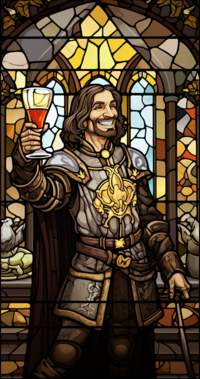Ranald
Ranald, also called "Smiling Ranald," the "God of Tricksters" and the "Trickster God," is the god of luck, fortune, mischief, tricksters, freedom, rogues, and thieves in the Old World Pantheon. Some scholars claim he is one of the Classical Gods who were introduced to the early Empire of Man by the nations of the south, while some Ranaldian factions vehemently argue that he was once a mortal. Ranald is the representative of many different aspects of life among the Men of the Old World, both positive and negative. Most commonly he is recognised as the divine patron of thieves and rogues, but aside from them his cult attracts gamblers and merchants, liars and tricksters, and the poor and downtrodden.
The nature of Ranald is to never be what he seems. Fittingly, his cult is a curious one that, to many, barely seems like a religious cult at all. It lacks the trappings, the pomp and majesty, even the structure of other Human religious cults. His temples are the gaming halls, the brothels, the taverns, and other dens of iniquity, not the gilt structures of gold and marble. Prayers to invoke him often take the form of riddling, questioning, and considering conundrums and enigmas. Fittingly, Ranald's priests are thieves, tricksters, and gamblers, rather than the educated, effete elite so favoured by other deities. Indeed, Ranald and his priests are unlike any others found among Men -- a fact that is both distressing and delightful. Ranald may even see fit to reveal the great joke of life to his priests, inspiring irreverent laughter in his own devoted in the face of the unsettling, intimidating, and terrifying.
The Cult of Ranald is, by general perception, a disorganised rabble of charlatans, thieves, and ne'er-do-wells. Authority figures loathe the worship of Ranald and do not embrace its clergy as they do those of other cults of the Old World, despising him as a god of thieves and scoundrels. Even the Empire's middle-class, who try to honour most of the gods equally to insure every aspect of their lives against calamity, dislike him, specifically the law-abiding folk.[6c] He is spoken of by the orthodox leaders of other cults as the wicked trickster god, a patron of "base personages."
However, Ranald is a far more popular god than one could determine by counting temples in the street. His cult is more co-ordinated than it appears, popular throughout the Empire and the Old World among a broad swath of people. He is popular among the urban poor, is a hero to the masses, and is beloved by all those whose daily tasks revolve around money. Those who dislike him still ensure the proper coins are slipped to the right people so that he will turn his eye from their businesses, and because he so loves to see the mighty fall, powerful merchants who got where they are by prayer to Ranald are sure to donate a great deal of their wealth to his cult.
Ranald blends truth and lies as if there were no difference. His priests are tricksters by nature, and those who call upon him often find themselves obsessed with change. Furthermore, Ranald may have some influence over the Winds of Magic, and a pact with him can prevent wizards from suffering the Curse of Tzeentch. And yet, as much as many in authority would like to see his cult dissipated, Ranald is in fact an official god of the Empire, and his cult permitted representation in the Grand Conclave of major Imperial religions. It even has Warrior Priests, typically master thieves, nimble rascals and military agents, who act on behalf of the Emperor.
What sets Ranald apart from darker gods, or even just the likes of Khaine, is that he is not evil or malicious. He is more a cheerful trickster than outright criminal, said to have a love of deflating pride with clever tricks and ruses, and ruled largely by his irrepressible sense of humour. His interest in larceny stems from his joy in the discomfiture of the pompous and self-important, rather than from avarice,[11a] and he considers anything that makes the authorities look like fools a job well done. Theft, cheating, lying, and skullduggery are all acceptable in his eyes,[1d] but he abhors violence of all kinds and prohibits it except as a last resort in self-defence and sometimes in cases of dishonor.
According to myth, Ranald was once mortal, a gentle bandit who robbed from the rich and gave to the poor. This so charmed Shallya that the goddess fell in love. One fateful day, she found Ranald dying, fatally touched by the plagues of the Fly Lord. Unable to accept this, she let Ranald drink from her holy chalice, granting the rogue eternal life. But it was all a trick — Ranald had faked it all — and, laughing, the new god gleefully danced into the heavens.
